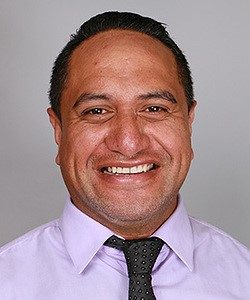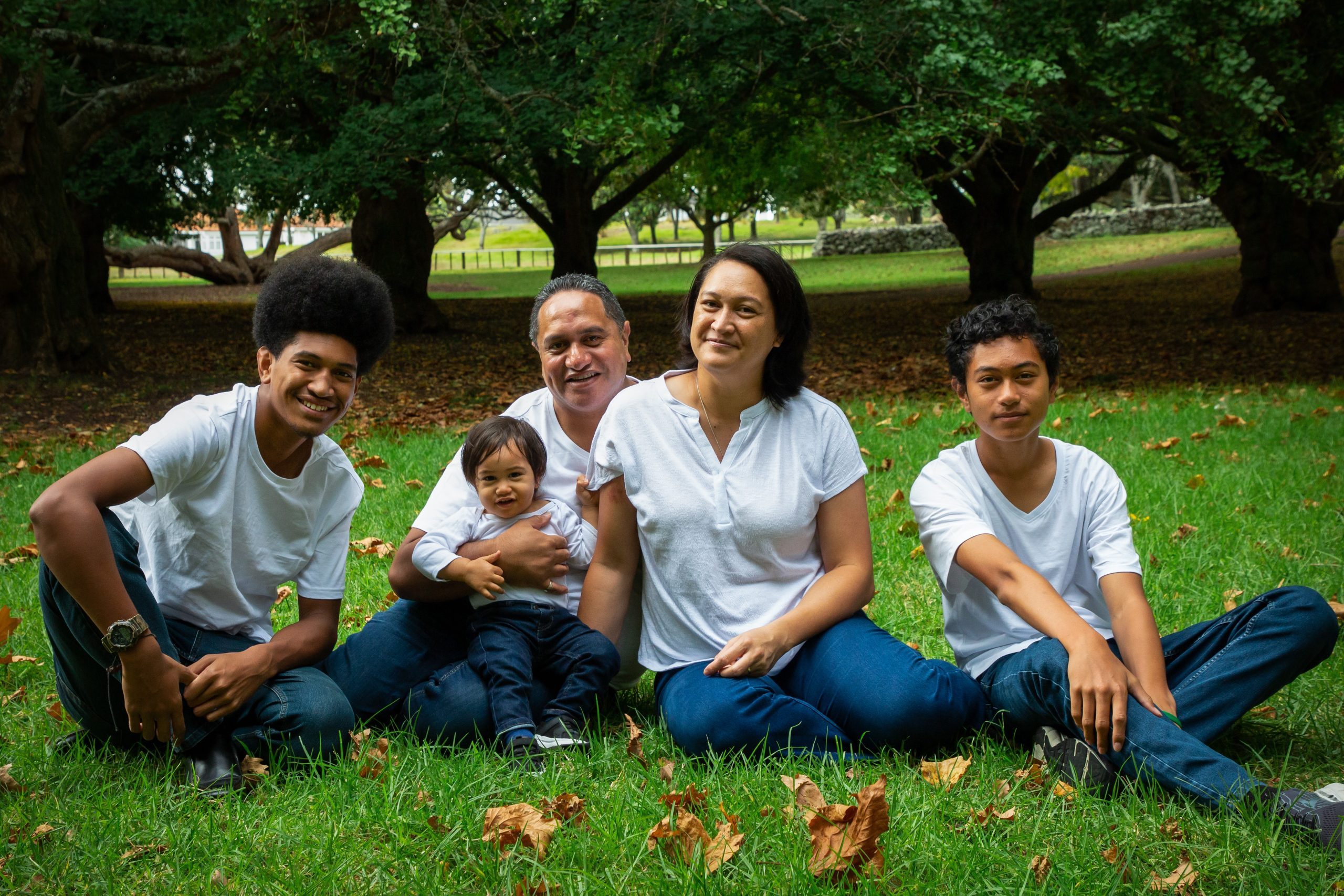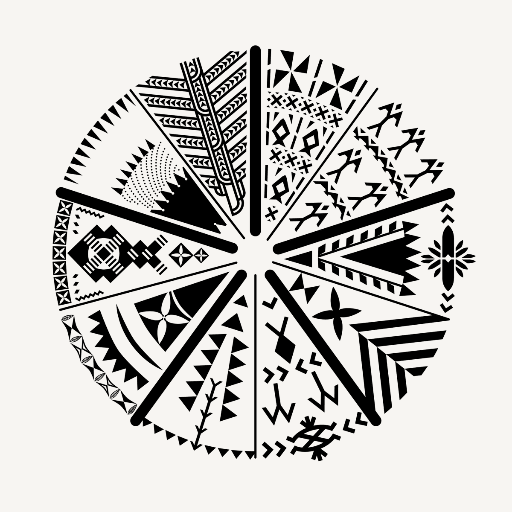I am worthy to learn what has always belonged to me

Claiming my identity through my language - Te Reo Māori Kūki ‘Āirani.
Ever since he was little boy, Teariki always had the impression that he was European. Growing up in South Auckland, his Pacific-ness was never questioned. It was not until he reached high school, when he was confronted with the hard-hitting question of identity and language loss.
Like many of his generation – there was no value in learning the language and to get ahead in this land of milk and honey, learning English was the only way forward. In the most recent survey, only 9% of Tangata Kūki ‘Āirani speak the language in Aotearoa New Zealand (Pacific Languages Strategy). According to UNESCO, the language is classified as vulnerable. This year, for the Epetoma o te reo Māori Kūki ‘Āirani – Cook Islands Language Week theme is – 'Ātuitui’ia au ki te au peu o tōku kāinga Ipukarea – “Connect me to the traditions and the culture of my homeland”.
Teariki Engu is a former Design Technology teacher at Kings College in South Auckland. He is a freelance graphic designer, an exhibiting painter and sculptor, often involved in music for various Christian and public events in his local area and abroad. He is married to Dr Matatoa Daniel and they have 3 kids.
In this article, Teariki share’s his story of making ‘connections’ and claiming back what belongs to him. A journey with many challenges. They say that it only takes a generation to lose a language – it is very likely that it is Teariki’s generation that can have the biggest impact in language revitalisation. It all starts with small steps, one person at a time, then one family and before you know it, we will have a whole village speaking the reo.
What made you start your journey to learn the language?
I was raised in South Auckland from birth, and I remember at around the age of 5 years old I was so sure that I was a European. Naive about my Pacific Island-ness, I was soon to be challenged when starting High school. I clearly recalled being asked ‘Can you speak the language?’ and then being told ‘You’re not a real Cook Islander if you can’t speak the language’. I was stunned that someone would challenge me that way. I became fascinated and later obsessed with proving my worth as a Cook Islander.
But regardless, I attempted to learn the Cook Island language and along the way I would be ridiculed and laughed at by my own people who spoke the language fluently, and again they made the comment that I am not a real Cook Islander because I couldn’t speak the language.
What was your first experience of the homeland?
I relied so much on my New Zealand-Cook Island upbringing to prepare me for my first visit to the Cook Islands. I read books, searched internet sites, asked my elders many questions to do with the Cook Islands, and although my research was extensive, I soon learned it meant nothing.
I arrived at the Rarotonga airport mid-afternoon while it was humid and was greeted by tipani flowers. I stayed in Titikaveka village for a few days, spent a week on the outer island of Atiu and returned to Rarotonga for a few days in Muri. I entertained locals by wearing a seatbelt in a car and embarrassed myself with my inexperience in cutting grass. It did startle me discovering that the main language in the Cook Islands is English. They spoke English mostly but would speak Cook Island to disguise their comments about me. Then I would hear that line again, that I am not a real cook Islander because I didn’t speak the language.
What challenges did you face along the way?
With my limited knowledge of culture and language – What if I could dance like a Cook Islander, make Cook Island food, create Cook Island arts and crafts, support Cook Island initiatives, represent the Cook Islands in sport and yet have no knowledge of the Cook Island language? Am I not a tangata Kūki ‘Āirani? Is my blood not enough?
I was conflicted with deciding if I should seek my language or just give up on it. Well, I chose to reclaim and strengthen my identity as a tangata Kūki ‘Āirani by learning the language. Not because I want to prove my Cook Island-ness, but because I am a tangata Kūki ‘Āirani. I am worthy to learn what has always belonged to me. I have nothing to prove.
What are you doing now to learn the language?
Since starting my journey with the Centre for Pacific Languages it has encouraged me to embrace singing Cook Island songs, memorizing and speaking bible verses in the Cook Island language. It has allowed me to having conversations with people who speak the Cook Island language, so that I can deepen my connection with my people. For this reason, I now look forward to family gatherings, church events, Cook Island events so that I can speak the language, mistakes and all. They can laugh at me and make fun of my reo. But in the end, I would come away from those conversations feeling satisfied that I added value to my people by putting in the effort to speak the language. For that I can proud and hold my head up high.
It is now my 2nd year, learning the Te Reo Māori Kūki ‘Āirani with the Centre for Pacific Languages. I have referred some of my friends and family who had similar challenges learning the language. I leave it up to them to make their own decision. It has been such a blessing for me to learn in a safe and encouraging environment with other students who have the same desire to learn. For anyone wanting to learn, the Centre for Pacific Languages has a platform for you to learn where you at and at your own pace. You become who you choose to become in the course based on how far you want to take this journey.
What are your plans for the future in your language learning journey?
I have chosen to take this journey as far as learning Cook Island bible verses and I have turned them into songs. I have also started the process of using my creative abilities to design a simple series of children’s books to teach the Cook Island language that I have learnt. I also plan to have an art exhibition that includes interaction with the Cook Island language in the paintings I create.
My faith is also important to me and I plan to preach a sermon in the Cook Island language to a Cook Island speaking church congregation. I have also encouraged my two eldest boys to join me on this journey and we all did the some te reo Māori Kūki ‘Āirani language courses at the Centre for Pacific Languages. Learning as a family has been a real joy – especially when you can share, sing, pray and Talanoa in your own reo, in the comfort of your home.
This is my way of contributing to our people and to keeping our language alive and accessible for our future generation of Cook Islanders. It is a deep sense of meaning to know that I have done my bit to keep our language alive. No matter how big or small the effort - it all counts.

Aka’aravei’anga – Introduction: In ending, let me share my Te Reo Maori Kuki Airani introduction that I learnt at the Centre for Pacific Languages.
Kia orāna kōtou kātoatoa, i te aro’a ma’ata o te Atua
Ko Te’āriki Karo’ōpunga tōku ingoa – My name is Te’āriki Karo’ōpunga
Ko Engu tōku kopu tangata – My family name is Engu
Kua akaipoipo au ko Dr Matatoa Daniel tāku va’ine – I am married to Dr Matatoa Daniel
‘Ē toru a maua tamariki, ko Taparia, Joshua e ko Tobias – W have 3 children, Taparia, Joshua and Tobias
‘Ē no’o ana au i ‘Ākarāna, Nū Tireni – I live in Auckland, New Zealand
Ko Teremakatea tōku metua tāne – My father’s name is Teremakatea
Kō Titikaveka tona ‘oire i Tumutevarovaro, e ko Vaipae i Araura – Titikaveka is his village in Rartonga and Vaipae in Aitutaki
Kō Teatuaravea tōku metua vā’ine – My mothers name is Teatuaravea
Kō Areora tona ‘oire i Enuamanu – Her village is ‘Areora in ‘Enuamanu
E rima a raua tamariki – My parents have 5 children
E ko au te openga – I am the youngest
E Ra’itu taku akono’anga – The Seventh Day Adventist is my church
Ko taku i rava reka rava atu tei roto tei reira ia: Isaia, pene ‘ā ngā’uru mā ta’i, irava ta’i ngā’uru – My favourite bible verse is Isaiah 41:10
Auraka e mataku, te vaitata katoa ‘o au ia koe - So do not fear for I am with you
Auraka e taitaia, ko au oki to’ou Atua - do not be dismayed for I am your God)
E akamaro’iro’i au ia koe, koia ïa, e tauturu au ia koe - I will strengthen you and help you
koia ïa, e mou au ia koe, i toku rima katau tuatua tika ra. - I will uphold you with my righteous right hand
Kia aro’a mai te atua ia tatou katoatoa. Kia orana e kia manuia.


Thanks for sharing your journey with the rest of us who has been on that same voyager as you. Love how bold you are! Blessings to the family. Ka kite ra! Lol!
Such an inspirational article. Lovely to see your family photo.
Well done Teariki! I am so proud of U for making the effort to learn your Cook Islands Maori Language. To tatou reo Maori Kūki Airani.
Great read Te’āriki, really resonate with your story.